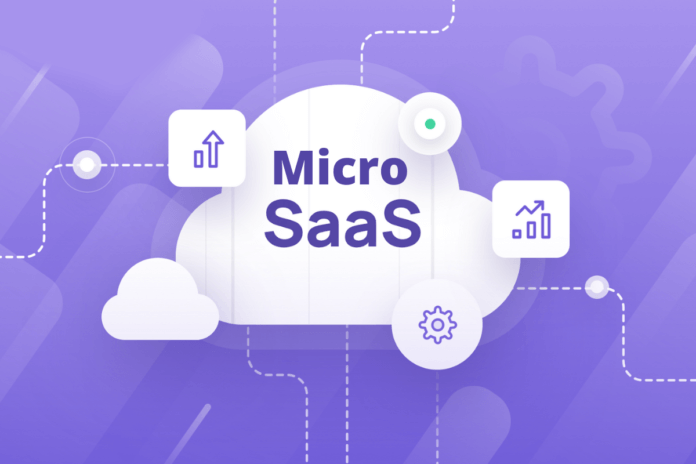The rise of Micro-SaaS (Software-as-a-Service) businesses has been remarkable these days. These small-scale software companies offer specialized solutions to niche markets, providing entrepreneurs with a unique opportunity to build profitable ventures. In this blog post, we will explore the top 10 benefits of starting a Micro-SaaS business, and why it is an attractive option for aspiring entrepreneurs.
Whether you’re already familiar with the concept or just getting started, this comprehensive guide will provide valuable insights to help you make informed decisions and achieve success in the world of Micro-SaaS.
Before moving straight to the benefits of micro-SaaS business, let’s first take an overview.
What Is Micro-SaaS? And Explain Micro-SaaS Business.
Micro SaaS, also known as Micro Software as a Service, refers to a business model where small-scale software applications are developed and offered as a service to customers. It involves creating and delivering niche software solutions that cater to specific needs or industries. Micro SaaS businesses typically focus on solving a particular problem or providing a specialized service, rather than offering a comprehensive software suite.
In a Micro SaaS business, the software is typically cloud-based and accessible through a subscription model. The applications are usually lightweight, user-friendly, and designed to address specific pain points or streamline particular tasks. These solutions are often characterized by their simplicity, ease of use, and affordability, making them attractive to small businesses, entrepreneurs, or individuals who require specific functionality without the complexity or high costs associated with larger software solutions.
If you are planning to get started your Micro SaaS business, then check our blog post How To Build a Profitable Micro-SaaS Business in 2025 for more clearer understanding.

Benefits of Starting a Micro-SaaS Business
Micro SaaS businesses have several benefits compared to traditional software companies. Here are some top benefits of micro saas business:
Benefit 1: Low Startup Costs
One of the key advantages of starting a Micro-SaaS business is the significantly low startup costs involved. Unlike traditional software development, which requires substantial investments in infrastructure, hiring developers, and marketing, Micro-SaaS businesses can be built with minimal resources.
- Utilize Cloud Infrastructure: By leveraging cloud-based infrastructure, entrepreneurs can save on expensive hardware and server costs. Cloud platforms like Amazon Web Services (AWS) or Microsoft Azure offer scalable and cost-effective solutions, allowing businesses to pay only for the resources they need.
- Outsource Non-Core Activities: Instead of hiring in-house staff, entrepreneurs can outsource non-core activities such as development, design, customer support, and marketing to freelancers or specialized agencies. This helps reduce overhead costs and provides access to expertise without the need for full-time employees.
Benefit 2: Flexibility and Work-Life Balance
For many aspiring entrepreneurs, the dream of achieving a better work-life balance is a major motivator. Micro-SaaS businesses offer unparalleled flexibility, allowing founders to work from anywhere and set their own schedules.
- Remote Work Opportunities: With the advent of remote work and digital collaboration tools, running a Micro-SaaS business has become even more accessible. Entrepreneurs can choose to work from home, coworking spaces, or even while traveling, providing the freedom to design their ideal work environment.
- Flexible Schedules: Unlike traditional 9-to-5 jobs, Micro-SaaS founders can define their own work schedules. They have the flexibility to allocate time for personal commitments, family, hobbies, or other pursuits, enabling a better work-life balance.
Benefit 3: Niche Market Opportunities
Micro-SaaS businesses thrive by catering to niche markets with specialized software solutions. By focusing on a specific industry or customer segment, entrepreneurs can identify pain points and develop tailored products to address them.
- Targeted Marketing: Niche markets often present untapped opportunities where larger software companies might not have a strong presence. By understanding the unique needs and challenges of a specific market segment, entrepreneurs can craft targeted marketing campaigns that resonate with their target audience.
- Customized Solutions: Micro-SaaS businesses have the advantage of creating highly customized solutions that meet the exact requirements of their niche market. This level of specialization allows for a better fit and a higher perceived value for customers, making it easier to attract and retain clients.
Benefit 4: Rapid Development and Deployment
Agility is a defining characteristic of Micro-SaaS businesses. Due to their small size and focused scope, these companies can develop and deploy software at an accelerated pace.

- Iterative Development: Micro-SaaS businesses can adopt an iterative development approach, releasing minimum viable products (MVPs) to gather user feedback early on. This allows for quick iterations and enhancements, ensuring that the final product aligns closely with customer needs.
- Continuous Deployment: By utilizing automated deployment pipelines and continuous integration practices, Micro-SaaS businesses can deploy updates and new features rapidly. This enables them to stay ahead of the competition and quickly respond to market demands.
Benefit 5: Scalability and Growth Potential
While Micro-SaaS businesses may start small, they have immense scalability and growth potential. With the advent of cloud computing, scaling software products has become easier than ever before.
- Cloud-based Infrastructure: Micro-SaaS businesses can leverage cloud-based infrastructure to scale their operations effortlessly. Cloud platforms offer flexible resources that can expand or contract based on demand, ensuring businesses can handle increasing customer usage without major infrastructure investments.
- Subscription-Based Models: Adopting a subscription-based pricing model provides recurring revenue streams, which are essential for sustained growth. As the customer base grows, the predictable revenue allows businesses to invest in marketing, product development, and customer acquisition strategies, further fueling growth.
Benefit 6: Reduced Time-to-Market
Time-to-market is a critical factor in the success of any software product. Micro-SaaS businesses excel in this area by delivering solutions to the market at a much faster pace compared to traditional software development.
- Agile Development Practices: By embracing agile methodologies, Micro-SaaS businesses can prioritize customer needs, rapidly develop features, and release updates more frequently. This allows them to stay ahead of the competition and quickly respond to market changes.
- Minimal Red Tape: With smaller teams and fewer decision-making layers, Micro-SaaS businesses can bypass lengthy bureaucratic processes and make decisions swiftly. This agility translates into reduced time-to-market, ensuring that the business can capitalize on emerging opportunities.
Benefit 7: Customer-Centric Approach
Micro-SaaS businesses thrive on their customer-centric approach. With a smaller customer base, entrepreneurs can provide personalized support and establish strong relationships with their clients.
- Personalized Customer Support: Micro-SaaS businesses can offer exceptional customer support by providing personalized assistance and quick response times. This level of attention helps build trust and loyalty, enhancing the overall customer experience.
- Incorporating User Feedback: By actively engaging with customers and soliciting their feedback, Micro-SaaS businesses can continually improve their products and address pain points. This customer-centric approach ensures that the software aligns closely with customer needs, leading to higher satisfaction and customer retention rates.
Benefit 8: Lower Maintenance and Support Overhead
Maintaining and supporting software products can be resource-intensive and costly for businesses. However, Micro-SaaS businesses can optimize their maintenance and support processes to reduce overhead.
- Automated Updates: By implementing automated update mechanisms, Micro-SaaS businesses can streamline the software maintenance process. This ensures that customers always have access to the latest features and security patches without requiring manual interventions.
- Cloud-Based Infrastructure: Hosting software on the cloud eliminates the need for on-site infrastructure maintenance and support. Cloud service providers take care of hardware updates, security, and backups, allowing businesses to focus their resources on value-added activities.
Benefit 9: Recurring Revenue Streams
Recurring revenue is a key driver of success for Micro-SaaS businesses. By adopting a subscription-based pricing model, these companies can enjoy predictable and recurring revenue streams.
- Subscription Pricing: Subscriptions provide a stable cash flow that enables businesses to plan for the future, invest in growth initiatives, and attract investors. Customers benefit from a continuous stream of value while paying a recurring fee, fostering a mutually beneficial relationship.
- Customer Retention: The subscription model promotes customer loyalty, as customers who continuously derive value from the software are more likely to renew their subscriptions. This reduces customer churn and ensures a stable revenue base for Micro-SaaS businesses.
Benefit 10: Exit Strategy and Investor Attraction
Entrepreneurs often have an exit strategy in mind when starting a business, and Micro-SaaS ventures offer attractive opportunities for successful exits.
- Acquisition Appeal: The recurring revenue generated through subscriptions makes Micro-SaaS businesses highly appealing to potential buyers or investors. Acquiring a Micro-SaaS business provides investors with an established customer base, predictable revenue streams, and the potential for further growth.
- Continued Growth Potential: Entrepreneurs who build successful Micro-SaaS businesses can achieve a rewarding exit by capitalizing on their hard work and expertise. By demonstrating consistent growth and a strong market position, founders can attract acquisition offers. Additionally, they can secure investments that maximize the value of their business.
Overall, starting a Micro-SaaS business can offer many benefits over traditional SaaS businesses
Successful Micro SaaS Business Examples:
Here are a few successful Micro SaaS business examples along with some statistics to provide a better understanding of their achievements:
1. Mailchimp:
- Description: Mailchimp is a Micro SaaS business that revolutionized email marketing for small businesses. It offers an intuitive platform for designing, automating, and analyzing email campaigns.
- Stats: With over 14 million customers worldwide, Mailchimp has become a leading email marketing service provider. It sends billions of emails every day, helping businesses reach their target audiences and drive conversions effectively.
2. Calendly:
- Description: Calendly is a Micro SaaS business that simplifies the process of scheduling appointments. It eliminates back-and-forth emails by allowing users to share their availability and let invitees book meetings directly.
- Stats: Calendly has gained massive popularity, with over 10 million users leveraging its intuitive scheduling solution. It handles millions of meetings each month, empowering individuals and teams to save time and streamline their calendars.
3. Buffer:
- Description: Buffer is a Micro SaaS business that enables businesses to manage and schedule their social media content across various platforms. It provides a centralized hub for content creation, publishing, and analytics.
- Stats: Buffer has amassed a strong user base, with more than 75,000 paying customers relying on its social media management tools. Annually, it facilitates the management of over $1 billion worth of social media content, helping businesses engage their audience effectively.
4. Zapier:
- Description: Zapier is a Micro SaaS business that allows users to connect different web applications and automate workflows. It simplifies data transfer and task automation, saving time and effort for individuals and businesses.
- Stats: Zapier has gained significant traction, serving more than 4 million users worldwide. Its platform has facilitated over 3 billion automation tasks, enabling seamless integration between various applications and streamlining business processes.
5. Typeform:
- Description: Typeform is a Micro SaaS business that reinvents online forms and surveys by providing a visually appealing and interactive user experience. It offers customizable templates and powerful features to gather feedback, conduct surveys, and capture data.
- Stats: With over 2.5 million users, Typeform has emerged as a popular choice for creating engaging forms and surveys. It has collected responses to over 1 billion questions, empowering businesses and individuals to collect actionable insights and make data-driven decisions.
These successful Micro SaaS businesses demonstrate the potential for growth and success within this business model. They have attracted large user bases, achieved substantial revenue, and made a significant impact in their respective markets.
To know about newly launched micro SaaS products you can visit the BufferApps platform. It is the perfect place to discover, try, test and buy newly launched Micro-SaaS products.

Conclusion – Micro-SaaS Business Benefits
Starting a Micro-SaaS business offers numerous benefits that make it an enticing choice for aspiring entrepreneurs. From low startup costs and flexibility to niche market opportunities and scalability, Micro-SaaS businesses provide a pathway to success. With a customer-centric approach, reduced time-to-market, lower maintenance overhead, and recurring revenue streams, entrepreneurs can build profitable and sustainable ventures.
Moreover, the potential for a successful exit strategy adds an extra layer of appeal for those looking to build and sell their businesses. So, if you’re considering venturing into the world of Micro-SaaS, seize the opportunities, embrace the benefits, and pave your path to entrepreneurial success.

